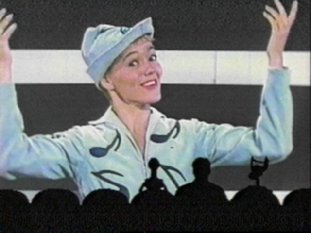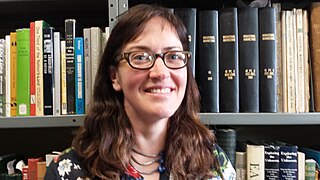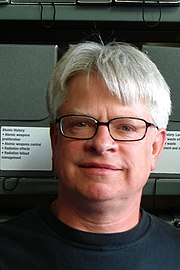
The House in the Middle is the title of two American documentary film shorts, respectively from 1953 and 1954, which showed the effects of a nuclear bomb test on a set of three small houses.
Social guidance films constitute a genre of propaganda films attempting to influence children and adults to behave in certain ways. Originally produced by the U.S. government as "attitude-building films" during World War II, the genre grew to be a common source of indoctrination in elementary and high school classrooms in the United States from the late 1940s to the early 1970s. The films covered topics including courtesy, grammar, social etiquette and dating, personal hygiene and grooming, health and fitness, civic and moral responsibility, sexuality, child safety, national loyalty, racial and social prejudice, juvenile delinquency, drug use, and driver safety; the genre also includes films for adults, covering topics such as marriage, business etiquette, general safety, home economics, career counseling and how to balance budgets. A subset is known as hygiene films addressing mental hygiene and sexual hygiene.

Ephemera are items which were not originally designed to be retained or preserved, but have been collected or retained. The word is etymologically derived from the Greek ephēmeros ‘lasting only a day’. The word is both plural and singular.
The Prelinger Archives is a collection of films relating to U.S. cultural history, the evolution of the American landscape, everyday life, and social history. It was in New York City from 1982 to 2002 and is now in San Francisco.

Henry Jamison "Jam" Handy was an American Olympic breaststroke swimmer, water polo player, and founder of the Jam Handy Organization (JHO), a producer of commercially sponsored motion pictures, slidefilms, trade shows, industrial theater and multimedia training aids. Credited as the first person to imagine distance learning, Handy made his first film in 1910 and presided over a company that produced an estimated 7,000 motion pictures and perhaps as many as 100,000 slidefilms before it was dissolved in 1983.

Ephemerality is the concept of things being transitory, existing only briefly. Academically, the term ephemeral constitutionally describes a diverse assortment of things and experiences, from digital media to types of streams. "There is no single definition of ephemerality". With respect to unique performances, for example, it has been noted that "[e]phemerality is a quality caused by the ebb and flow of the crowd's concentration on the performance and a reflection of the nostalgic character of specific performances". Because different people may value the passage of time differently, ephemerality may be a relative, perceptual concept: "In brief, what is short-lived may not be the object itself, but the attention we afford it".

Mr. B Natural is a short sponsored film produced in 1956 by Kling Film Productions for the C.G. Conn Company, directed by Phil Patton. It is also the name of the film's main character, played by Betty Luster.
The Calvin Company was a Kansas City, Missouri-based advertising, educational and industrial film production company that for nearly half a century was one of the largest and most successful film producers of its type in the United States.
Kate Dollenmayer is an American actor and film archivist. She made her debut as the star of Andrew Bujalski's 2002 film Funny Ha Ha. She subsequently appeared in Bujalski's next film Mutual Appreciation in 2005.
Sponsored film, or ephemeral film, as defined by film archivist Rick Prelinger, is a film made by a particular sponsor for a specific purpose other than as a work of art: the films were designed to serve a specific pragmatic purpose for a limited time. Many of the films are also orphan works since they lack copyright owners or active custodians to guarantee their long-term preservation.
An orphan film is a motion picture work that has been abandoned by its owner or copyright holder. The term can also sometimes refer to any film that has suffered neglect.

Keller Easterling is an American architect, urbanist, writer, and professor. She is Enid Storm Dwyer Professor and Director of the MED Program at Yale University.

Scratch and Crow (1995) is a four-minute, 16mm, animated film made by Helen Hill as her MFA thesis at the California Institute of the Arts. On January 1, 2017, an authorized Helen Hill Vimeo account launched and includes a high-resolution streaming version of the film, with this annotation: "This hand drawn animated film reveals the secret life cycle of chickens, from their hatching by mother cats to their noisy ascent into Heaven. Filmed in 16 mm."

The William L. Clements Library is a rare book and manuscript repository located on the University of Michigan's central campus in Ann Arbor, Michigan. Specializing in Americana and particularly North American history prior to the twentieth century, the holdings of the Clements Library are grouped into four categories: Books, Manuscripts, Graphics and Maps. The library's collection of primary source materials is expansive and particularly rich in the areas of social history, the American Revolution, and the colonization of North America. The Book collection includes 80,000 rare books, pamphlets, broadsides, and periodicals. Within the other divisions, the library holds 600 atlases, approximately 30,000 maps, 99,400 prints and photographs, 134 culinary periodicals, 20,000 pieces of ephemera, 2,600 manuscript collections, 150 pieces of artwork, 100 pieces of realia, and 15,000 pieces of sheet music.

Todd Webb was an American photographer notable for documenting everyday life and architecture in cities such as New York City, Paris as well as from the American west. He traveled extensively during his long life and had important friendships with artists such as Berenice Abbott, Walker Evans, Alfred Stieglitz, Georgia O'Keeffe, Ansel Adams, Dorothea Lange, and Harry Callahan.

Morton Marcus (1936–2009) was an American poet and poetry critic.

Last Clear Chance is a 1959 American short film produced and directed by Robert Carlisle.

Megan Prelinger is a cultural historian and archivist. She is the co-founder of the Prelinger Library in San Francisco and author of two books: Another Science Fiction: Advertising the Space Race 1957–1962 and Inside the Machine: Art and Invention in the Electronic Age.

John Parker Glick was an American ceramicist. Though open to artistic experimentation, Glick was most influenced by the styles and aesthetics of Asian pottery—an inspiration that shows in his use of decorative patterns and glaze choices. His experience working with ceramics led him to publish several articles about the craft. In addition to producing pottery, Glick began making "landscape oriented" wall panels during the latter part of his career. Known as "the people's potter," he is primarily remembered for his contributions to art and the field of ceramics.
Panorama Ephemera is a 2004 collage film by film archivist Rick Prelinger.














